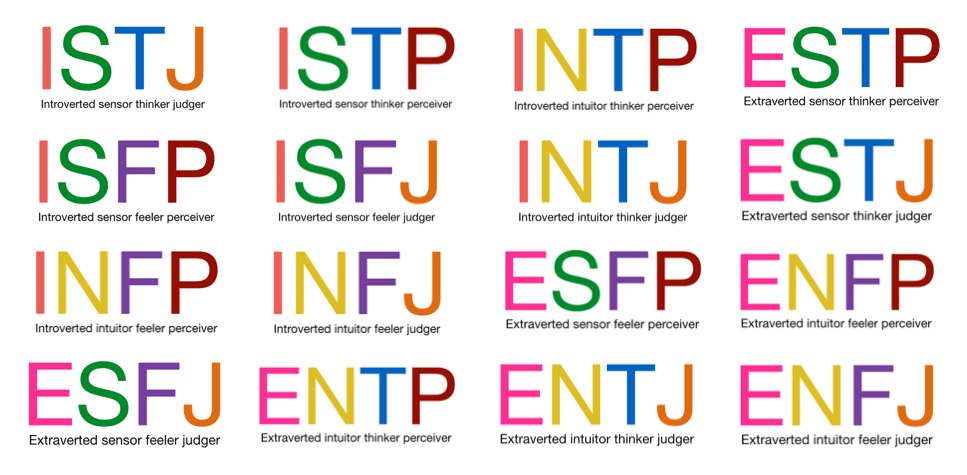I recently came across an interesting topic that piqued my curiosity: the Myers-Briggs Personality Type Test. As someone who has always been fascinated by human behavior and personality, I couldn’t help but delve into the world of personality types and self-discovery.
Understanding Yourself with the Myers-Briggs Personality Test
 The Myers-Briggs Personality Type Test is a popular assessment tool designed to uncover different aspects of an individual’s personality. Developed by Katharine Cook Briggs and her daughter Isabel Briggs Myers, this test has become widely recognized and utilized in various fields, including psychology, career counseling, and personal development.
The Myers-Briggs Personality Type Test is a popular assessment tool designed to uncover different aspects of an individual’s personality. Developed by Katharine Cook Briggs and her daughter Isabel Briggs Myers, this test has become widely recognized and utilized in various fields, including psychology, career counseling, and personal development.
One of the reasons why the Myers-Briggs Personality Type Test has gained such popularity is its ability to provide individuals with insightful self-reflection. By identifying various personality traits, strengths, and weaknesses, this test offers a unique perspective into how we perceive the world and interact with others.
Taking the test can be a thought-provoking experience as it categorizes individuals into sixteen different personality types. Each type is represented by a combination of four different letters, which stand for different traits. These traits include extraversion (E) vs. introversion (I), sensing (S) vs. intuition (N), thinking (T) vs. feeling (F), and judging (J) vs. perceiving (P). For example, someone with an ESFJ personality type possesses extraversion, sensing, feeling, and judging traits.
Unleashing the Power of Personality Types
 From career choices to personal relationships, understanding your personality type can have a profound impact on various aspects of your life. It can help you uncover your natural strengths, discover suitable career paths, enhance communication skills, and even offer guidance when it comes to personal growth.
From career choices to personal relationships, understanding your personality type can have a profound impact on various aspects of your life. It can help you uncover your natural strengths, discover suitable career paths, enhance communication skills, and even offer guidance when it comes to personal growth.
For instance, if you have an ISTJ (Introverted, Sensing, Thinking, Judging) personality type, you may excel in roles that require attention to detail, meticulous planning, and a structured approach. On the other hand, an ENFP (Extraverted, Intuitive, Feeling, Perceiving) personality type may thrive in creative fields that emphasize empathy, innovation, and adaptability.
It’s important to note that these personality types are not meant to restrict or label individuals. Instead, they serve as a tool for self-reflection and self-awareness. They assist in better understanding who we are, why we behave the way we do, and how we can navigate the world around us.
Exploring the Visual Representation of Personality Types
![Myers Briggs Test (5 Mins) [Free MBTI Quiz] - Practical Psychology](http://practicalpie.com/wp-content/uploads/2021/03/Printable-Myers-Briggs-Matrix.png) Visual representations of personality types, such as the Myers-Briggs Matrix, can provide a clearer understanding of the different traits associated with each type. These matrices often display the sixteen personality types in a grid-like format, giving individuals a visual overview of the relationships between the various types.
Visual representations of personality types, such as the Myers-Briggs Matrix, can provide a clearer understanding of the different traits associated with each type. These matrices often display the sixteen personality types in a grid-like format, giving individuals a visual overview of the relationships between the various types.
It’s interesting to see how each personality type aligns or contrasts with others. The matrix allows us to observe patterns and potential compatibility between different types. Additionally, it offers insights into the strengths and weaknesses of each personality type, helping us gain a deeper appreciation for the diversity of human behavior and personality.
Adding a Personal Touch to Personality Types
 As we explore the world of personality types and the Myers-Briggs Test, it’s essential to remember that our individual experiences and backgrounds influence how we express our personality traits. Each person brings a unique perspective shaped by their cultural heritage, personal beliefs, and upbringing.
As we explore the world of personality types and the Myers-Briggs Test, it’s essential to remember that our individual experiences and backgrounds influence how we express our personality traits. Each person brings a unique perspective shaped by their cultural heritage, personal beliefs, and upbringing.
Being a person of color, I find it important to incorporate a personal touch that speaks to the black experience. It’s essential to recognize that personality types transcend race, and they are not exclusive to any particular racial or ethnic group. However, the way we navigate the world and express ourselves is influenced by our cultural backgrounds and societal influences.
By acknowledging and celebrating our diverse experiences, we can add depth and richness to the exploration of personality types. It encourages inclusivity and highlights the significance of embracing different perspectives within the context of these tests.
Embracing Self-Discovery and Personal Growth
 Ultimately, the Myers-Briggs Personality Type Test offers a gateway to self-discovery and personal growth. By understanding our personality traits, we can identify areas for improvement, leverage our strengths, and cultivate meaningful relationships with others.
Ultimately, the Myers-Briggs Personality Type Test offers a gateway to self-discovery and personal growth. By understanding our personality traits, we can identify areas for improvement, leverage our strengths, and cultivate meaningful relationships with others.
Whether you are an ISTJ, ENFP, or any other personality type, embracing self-reflection and embracing personal development can lead to a more fulfilled and authentic life. It’s a continuous journey that allows us to grow, adapt, and connect with ourselves and those around us on a deeper level.
In conclusion, the Myers-Briggs Personality Type Test is a valuable tool for self-exploration and understanding. Through visual representations, personal reflections, and embracing diversity, this test can enrich our lives and facilitate personal growth. So, why not embark on this exciting journey of self-discovery and uncover the secrets hidden within your unique personality type?